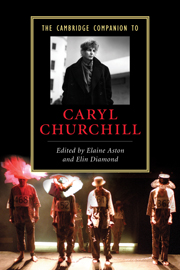Book contents
- Frontmatter
- 1 Introduction: on Caryl Churchill
- 2 On feminist and sexual politics
- 3 On owning and owing: Caryl Churchill and the nightmare of capital
- 4 On the challenge of revolution
- 5 On text and dance: new questions and new forms
- 6 On Caryl Churchill’s ecological drama: right to poison the wasps?
- 7 On performance and selfhood in Caryl Churchill
- 8 On Churchill and terror
- 9 On collaboration: ‘not ordinary, not safe’
- 10 On Churchill’s influences
- Select bibliography
- Index
1 - Introduction: on Caryl Churchill
Published online by Cambridge University Press: 28 March 2010
- Frontmatter
- 1 Introduction: on Caryl Churchill
- 2 On feminist and sexual politics
- 3 On owning and owing: Caryl Churchill and the nightmare of capital
- 4 On the challenge of revolution
- 5 On text and dance: new questions and new forms
- 6 On Caryl Churchill’s ecological drama: right to poison the wasps?
- 7 On performance and selfhood in Caryl Churchill
- 8 On Churchill and terror
- 9 On collaboration: ‘not ordinary, not safe’
- 10 On Churchill’s influences
- Select bibliography
- Index
Summary
The scene is set for intimacy. Two men occupy a sofa on an otherwise empty stage. They talk - one with an American accent, the other English. Their conversation is elliptical. Half-formed sentences leave the spectators to fill in blanks and gaps, but offer enough to suggest a state of renewed sexual attraction, a power game that leads one man (English), to declare his intention to leave his family and join the other (American) on a grotesque spree of global domination. This is how Drunk Enough to Say I Love You?, Caryl Churchill's most recent, full-length play (at the time of writing this introduction) opened at London's Royal Court Theatre Downstairs in 2006, the theatre with which Churchill has forged a close and enduring relationship, dating back to 1972 when she made her professional playwriting debut with Owners. Characteristically, Drunk Enough is a politically charged play which evidences Churchill's unsurpassed ability to dramatize the anxieties and concerns of the contemporary moment. In this particular instance, it is the nightmare realities created by the wholesale, worldwide exportation of materialist values in which the lives of others are devalued, damaged and destroyed by a 'turbo' capitalist creed of greed. This is not, however, a new topic for Churchill. Rather, the painful realities of a world divided by those who 'own' and those who are 'owned' and the havoc this wreaks on the lives and communities of men and especially women is a subject that frequently haunts her playwriting.
- Type
- Chapter
- Information
- The Cambridge Companion to Caryl Churchill , pp. 1 - 17Publisher: Cambridge University PressPrint publication year: 2009
- 2
- Cited by



